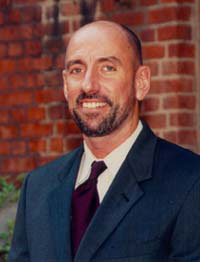New Director of the Office of Sponsored Programs:
Drawn to TC by his love of learning and higher education, Paul Kran joined the staff as Director of the Office of Sponsored Programs this fall.
Kran comes to TC from Baruch College where he served as the Director of Office of Sponsored Programs and Research since 1996. Prior to that, he worked at the Research Foundation for CUNY as Executive Assistant to the President.
In his position, Kran oversees the pre-awards grants office and the Institutional Review Board (IRB), the committee that handles human subject research. He identifies sponsors for particular areas of research or training projects and helps with budgeting. He oversees the execution of contracts, independent contractor agreements and gives legal advice. Also, he is the point of contact between researchers and people at sponsoring agencies.
Another large portion of his job is to oversee the Institutional Review Board. "Any entity that receives federal funding for research has one," he said. The IRB at TC is made up of about 16 people including faculty members from each department who would be doing research, one non-scientist and one community member. The latter two members help to give the perspective of someone who would be participating in the studies.
Since many doctoral students are required to do a human subject research component to their dissertation, the Board was established to protect the rights of these subjects, Kran said. It also makes sure that the subject's benefits are maximized and that the subject gives fully informed consent.
Human subjects are most commonly thought of in medical situations. However, surveys and interviews also use human subjects. "The subjects used by TC students have risks, too," said Kran. "They are different than in medical situations, but they need to be taken seriously."
It is important to pay attention to these needs when dealing with minors, he said. Everyone needs to be participating freely. When kids are in a school situation and a teacher asks if they want to participate, they may feel coerced into the study. One way to do this, he added, is to make sure that people who aren't participating have something to do that will earn them the same amount of credit with their teachers.
Due to problems at other Universities, regulations have changed and are now under more scrutiny. One new requirement is that members of the IRB and people who get money from the U.S. Department of Health and Human Services (DHHS) must to certify that they have gone through basic training in human subject protections.
The training is online at the National Institute of Health Web site, a division of the DHHS, he said. The test is completed online in about a half-hour and certifies that person in human subject protection. (See Sidebar.)
The program based at TC is being developed now, said Kran. He is planning more outreach to the community at large such as workshops and expanded material on the Web about human subjects.
"This new requirement can be confusing," he said. "However, it's not another test, it's just to make sure that people who participate are at a limited risk and with some benefit to them."
Kran is available for professors if they would like him to visit classes. He said that he can train people for human subject protection and help them fill out TC's IRB application. For further information, stop by Kran's office at 422K Thompson or call him at 678-4106.
Published Monday, May. 20, 2002
